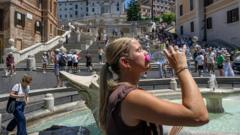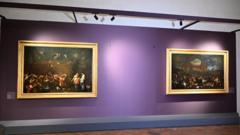Critics in Italy are decrying government intervention in the arts after officials replaced experts in a Futurism exhibition with their own appointees, resulting in what many see as a glorification of Mussolini's regime.
Italian Government's Interference in Futurism Exhibition Sparks Outrage

Italian Government's Interference in Futurism Exhibition Sparks Outrage
The recent opening of a Futurism exhibition in Rome has raised concerns over political meddling in the arts, as experts were sidelined in favor of a new organizing committee.
Italy's art scene is grappling with controversy following the opening of a major Futurism exhibition at the National Gallery of Modern and Contemporary Art in Rome. The event, which attracted a large crowd eager to delve into this pivotal movement that defined 20th-century Italian art, has been overshadowed by allegations of government interference. The Ministry of Culture unexpectedly dismissed a team of scholars and critics who had dedicated months to curating the exhibition, opting instead to introduce a new committee that has sparked criticism for seemingly glorifying the era of Benito Mussolini.
Massimo Duranti, one of the removed experts, expressed dismay, claiming he was essentially told, “arrivederci” – a dismissal of his contributions to the project. In their place, the committee now includes members who are not specialists in Futurism, such as an architect and an archaeologist. Duranti accused the new organizers of creating a narrative that celebrates Futurism during the Fascist regime, which has deepened concerns about political motivations behind the changes.
Massimo Osanna, who leads Italy’s state museums, rejected claims that the restructuring of the committee was ideologically driven. He stated that the previous experts were never formally appointed, emphasizing that the new team aimed to present the era comprehensively. This situation comes in the context of past controversies surrounding former culture minister Gennaro Sangiuliano, who had prioritized a Futurism exhibition before his tenure was marred by personal scandal.
The shift in curatorial direction raises critical questions about the role of government in cultural institutions, as Italy continues to confront its historical narratives and the legacies of Fascism. As the art community and the public express their dissent, the future implications of this incident on artistic expression and historical representation loom large.





















